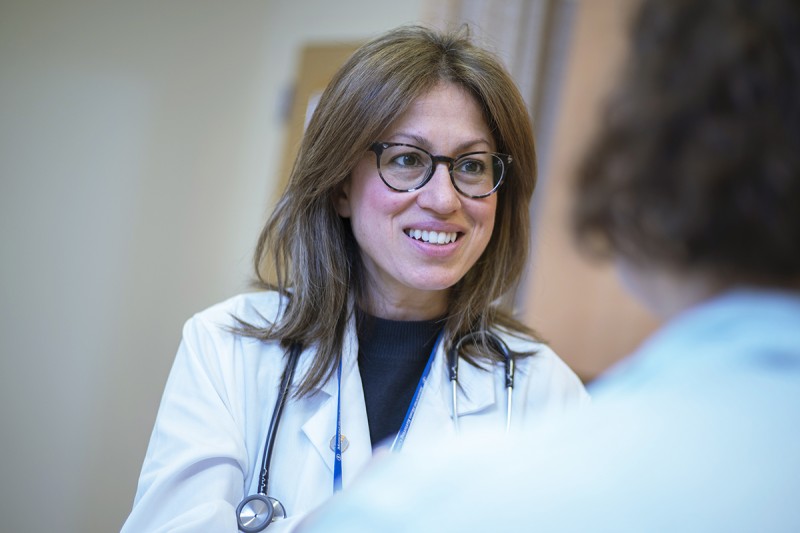
Standing ovations may be common on Broadway, but they are extremely rare at medical conferences. So when people leapt to their feet at the end of a presentation by Shanu Modi, MD, at one of the year’s most important cancer meetings, she was overwhelmed.
“It really caught me off guard,” remembers Dr. Modi, a breast medical oncologist at Memorial Sloan Kettering Cancer Center (MSK). “I knew going in that people were enthusiastic about this data and were anxious to see the results. But the level of emotion in the room at that moment left me speechless.”
Dr. Modi’s peers were applauding clinical trial results that suggest a new standard of care for more than half of people with metastatic breast cancer. The study found the first targeted therapy to be effective in patients with low levels of a protein called HER2 on their tumors.
The Difficulty in Treating HER2-Low Breast Cancer
The protein HER2 activates cancer growth. When doctors say a cancer is “HER2-positive,” that means there are high levels of the protein on the surface of cancer cells. “We have wonderful targeted therapies for HER2-high cancers. They were among the first targeted drugs,” says Dr. Modi. “It’s been frustrating that these drugs have not been effective treating breast cancers with lower levels of HER2.” But Dr. Modi’s research demonstrates there’s a way to block HER2 even when levels of the protein are low — the case for about 55% of people with breast cancer.
HER2-Low Metastatic Breast Cancer Clinical Trial Results
In the international clinical trial, patients with HER2-low metastatic breast cancer survived significantly longer when they took the targeted drug trastuzumab deruxtecan (also known as T-DXd, or Enhertu®). The drug stopped tumors from growing for an average of more than 10 months, about twice as long as standard chemotherapy. Patients who received T-DXd lived on average almost two years — about six months longer than those who received standard treatment.
“T-DXd is far better than anything else we’ve traditionally been able to offer to this very significant proportion of patients,” Dr. Modi says. “We’re finding so many who can benefit from it.”
Antibody-Drug Conjugates for Breast Cancer: An Innovative New Class of Cancer Drugs
T-DXd is an antibody-drug conjugate, a new class of drug that consists of two parts linked together:
- An antibody that homes in on cancer cells.
- A potent dose of chemotherapy.
Like a heat-seeking missile, the antibody delivers the chemotherapy payload directly to its target, reducing the collateral damage of side effects seen with more traditional chemotherapy.
One reason this antibody-drug conjugate is so effective is the “bystander effect.” It kills not only cancer cells but also some of the cells around them, known as the tumor microenvironment, which includes the blood vessels and immune cells that support tumor growth.
“Cancer is not just a disease of cancer cells. It’s a disease that involves other cells living in the vicinity of the cancer cells that help keep them alive,” says medical oncologist Larry Norton, MD, MSK Senior Vice President and Medical Director of the Evelyn H. Lauder Breast Center. “Our ability to target the microenvironment — whether with an antibody-drug conjugate, an immunotherapy, or new drugs in development — is leading to a major revolution in cancer treatment.”
The transformational results Dr. Modi presented in June 2022 at the Annual Society of Clinical Oncology meeting were published in The New England Journal of Medicine on the same day. Two months later, the drug was approved after being granted Fast Track designation from the U.S. Food and Drug Administration (FDA). (It had already been approved to treat HER2-positive breast cancer.) There are side effects from T-DXd, but most can be managed with medication. Severe lung inflammation is the most serious, but it is uncommon.
‘It’s Just a Start’
Thanks to targeted therapies that can keep cancer at bay for months or even years until the next treatment advance comes along, there’s been a lot of talk about transforming metastatic cancer from a fatal disease to a chronic condition. But even that is not good enough for Dr. Modi — or her patients.

“Our ultimate goal is to fully eradicate metastatic breast cancer,” she says. “Prolonging survival by six months is meaningful for these patients, but it’s just a start.”
Studies are already underway to combine T-DXd with other drugs, like immunotherapy, and to give it sooner after someone is diagnosed with breast cancer. This drug was also recently approved by the FDA to treat lung cancer with HER2 mutations.
“T-DXd has opened the door, and we can see the sunlight coming through,” Dr. Norton says. “We are not at the end of the tunnel yet, but we know which direction we need to go.”
That moment in the conference ballroom when Dr. Modi’s peers stood up to cheer her results was powerful for her personally. She was first drawn to oncology for the intellectual challenge and to breast cancer, specifically, for a deep emotional connection to her patients. “They inspire me in so many ways,” she says. “I’m always optimistic that there’s something great just around the corner. It’s our job to find it.”
Dr. Norton holds the Norna S. Sarofim Chair in Clinical Oncology.




